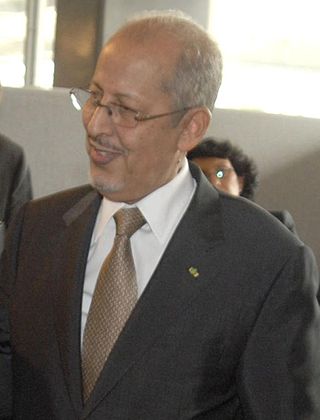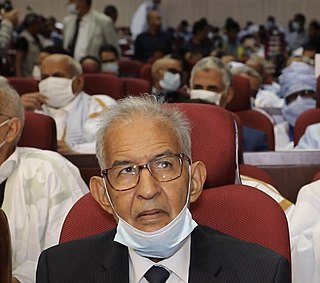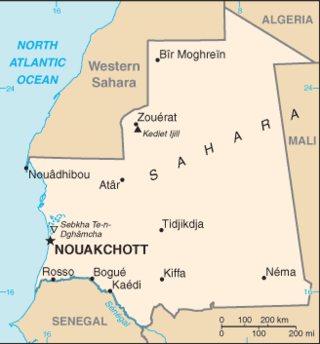| |||||
| Decades: | |||||
|---|---|---|---|---|---|
| See also: | |||||
The following lists events that happened during 1960 in Mauritania .
| |||||
| Decades: | |||||
|---|---|---|---|---|---|
| See also: | |||||
The following lists events that happened during 1960 in Mauritania .

Mauritania is a presidential democracy, but has suffered from repeated military coups since its Independence in November 1960. For 18 years after independence, Mauritania was a one-party state under Moktar Ould Daddah. This was followed by decades of military rule. The first fully democratic presidential election in Mauritania occurred on 11 March 2007, which marked a transfer from military to civilian rule following the military coup in 2005. The election was won by Sidi Ould Cheikh Abdallahi, who was ousted by another military coup in 2008 and replaced by general Mohamed Ould Abdel Aziz. Mauretania underwent its first peaceful transition of power after the 2019 presidential election, although this was between two presidents of the ruling UPR party and former army generals.

Moktar Ould Daddah was a Mauritanian politician who led the country after it gained its independence from France. Moktar served as the country's first Prime Minister from 1957 to 1961 and as its first President of Mauritania, a position he held from 1960 until he was deposed in a military coup d'etat in 1978.

Tiris al-Gharbiyya was the name for the area of Western Sahara under Mauritanian control between 1975 and 1979.
Mauritanian People's Party was the sole legal party of Mauritania from 1961 to 1978. It was headed by President Moktar Ould Daddah.

Presidential elections were held in Mauritania on 11 March 2007. As no candidate received a majority of the votes, a second round was held on 25 March between the top two candidates, Sidi Ould Cheikh Abdallahi and Ahmed Ould Daddah. Abdallahi won the second round with about 53% of the vote and took office in April.
Opération Lamantin was a December 1977 – July 1978 military intervention by France on the behalf of the Mauritanian government, in its war against Sahrawi guerrilla fighters of the Polisario Front, seeking independence for Western Sahara. Airstrikes were launched in the provinces with the aim of stopping separatist raids in the rail route from the iron mines in Zouérat to the coast of Nouadhibou, and pushing them to release French hostages. France used Jaguar combat aircraft from Dakar Airbase. The bombings targeted areas around the railway, which was constantly raided by Polisario. The mission ended with the release of the hostages and the halt of Polisario's attacks on ore cargo.

Ahmed Ould Daddah is a Mauritanian economist and a politician. He is a half-brother of Moktar Ould Daddah, the first President of Mauritania, and belongs to the Marabout Ouled Birri tribe. He is currently the President of the Rally of Democratic Forces (RFD) and was designated as the official Leader of the opposition following the 2007 presidential election, in which he placed second.

Sidi Mohamed Ould Cheikh Abdallahi was a Mauritanian politician who was President of Mauritania from 2007 to 2008. He served in the government during the 1970s, and after a long period of absence from politics he won the March 2007 presidential election, taking office on 19 April 2007. He was deposed in a military coup d'état on 6 August 2008.

Greater Mauritania is a term for the Mauritanian irredentist claim that generally includes the Western Sahara and other Sahrawi-populated areas of the western Sahara Desert. The term was initially used by Mauritania's first President, Mokhtar Ould Daddah, as he began claiming the territory then known as Spanish Sahara even before Mauritanian independence in 1960.

Mauritania, officially the Islamic Republic of Mauritania, is an Arab Maghreb country in West Africa. It is bordered by the Atlantic Ocean in the west, by Morocco in the north, by Algeria in the northeast, by Mali in the east and southeast, and by Senegal in the southwest. It is named after the ancient Berber Kingdom of Mauretania, which later became a province of the Roman Empire, even though the modern Mauritania covers a territory far to the south of the old Berber kingdom that had no relation with it.
During the late colonial period, Mauritania had few contacts with the other territories of French West Africa. At the time of the independence referendum in 1958, Mauritania's representatives on the Grand Council of the AOF remained neutral, while all other AOF members divided between the African Democratic Rally and the African Regroupment Party. Until Mauritania became independent and Morocco threatened its security, Mauritania did not participate in AOF intraterritorial political, labor, or cultural movements. Only when Mauritania's existence as a state became problematic did it seek international recognition and support.

Mauritania, formally the Islamic Republic of Mauritania, is a sovereign country in Northwest Africa. It is bordered by the Atlantic Ocean to the west, Western Sahara to the north and northwest, Algeria to the northeast, Mali to the east and southeast, and Senegal to the southwest. By land area Mauritania is the 11th-largest country in Africa and 28th-largest in the world; 90% of its territory is in the Sahara. Most of its population of some 4.3 million lives in the temperate south of the country, with roughly a third concentrated in the capital and largest city, Nouakchott, on the Atlantic coast.

Presidential elections were held in Mauritania on 18 July 2009. Mohamed Ould Abdel Aziz, who led the 2008 coup d'état, won a narrow first-round majority in the election, according to official results. A second round, if necessary, would have been held on 1 August 2009.

Parliamentary elections were held in Mauritania on 17 May 1959. The result was a victory for the Mauritanian Regroupment Party, which was the only party to contest the elections, thereby winning all 40 seats in the National Assembly. Voter turnout was 90.3%.

Presidential elections were held for the first time in Mauritania on 20 August 1961 to elect the President for the next five years. Moktar Ould Daddah, who had been acting head of state since independence from France in 1960 was the only candidate, and was elected unopposed. Although he was a member of the ruling Mauritanian Regroupment Party, his candidacy was also supported by the Mauritanian National Union. Voter turnout was 94%.

Presidential elections were held in Mauritania on 7 August 1966. Following the merger of all the country's political parties into the Mauritanian People's Party (PPM), the country had become a one-party state in December 1961. Its leader, incumbent President Moktar Ould Daddah, was the only candidate, and was re-elected unopposed. Voter turnout was 96%.

General elections were held in Mauritania on 8 August 1971 to elect a President and National Assembly, the first time the two elections had been held together. At the time, the country was a one-party state with the Mauritanian People's Party (PPM) as the sole legal party. Its leader, incumbent President Moktar Ould Daddah, was the only candidate in the presidential election, and was re-elected unopposed to a third term in office, whilst the PPM won all 50 seats in the National Assembly election. Voter turnout for the parliamentary election was reported to be 95.6%.

Presidential elections were held in Mauritania on 8 August 1976, alongside a parliamentary by-election for the new seven seats representing Tiris El Gharbiya, the Mauritanian-occupied area of Western Sahara. At the time, the country was a one-party state with the Mauritanian People's Party (PPM) as the sole legal party. Its leader, incumbent President Moktar Ould Daddah, was the only candidate and was re-elected unopposed. Voter turnout was 97.9%. They were the last elections held until the restoration of multi-party democracy in 1992.
The Mauritanian Regroupment Party was a political party in Mauritania from 1958 to 1961. Although nominally led by party President Sidi el-Mokhtar N'Diaye, it was de facto headed by Moktar Ould Daddah.

The 1978 Mauritanian coup d'état was a bloodless military coup in Mauritania which took place on 10 July 1978. The coup, led by the Army Chief of Staff, Colonel Mustafa Ould Salek, who commanded a group of junior officers, overthrew President Moktar Ould Daddah, who ruled the country since independence from France in 1960.